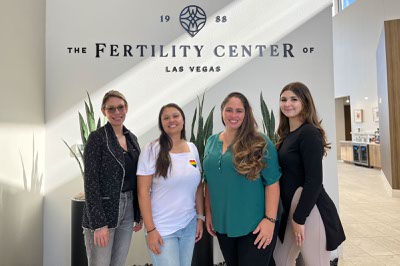
Shutterstock photo illustration
Las Vegas is a popular place for people from around the world to target for their surrogacy journeys. Nevada boasts unique legal protections that help surrogates and intended parents in the process of bringing a child into the world, officials with the SurrogateFirst agency say.
Thursday, Nov. 23, 2023 | 2 a.m.
A group of women and their families are enjoying tacos on this recent weekend in Las Vegas and sharing stories about what’s brought them together: The experience of carrying someone else’s child.

The Fertility Center of Las Vegas just opened its new office off of Durango Drive in southwest Las Vegas. From left are, Shiva Price, vice president of global operations and Dr. Leah Kaye, reproductive endocrinology and infertility specialist, both with the Fertility Center, and Ashley Mareko, surrogate program director and Yessenia Latorre, surrogacy educator, both with the SurrogateFirst agency.
They are surrogates with an agency called SurrogateFirst, which matches intended families with a surrogate, or gestational carrier, who carries and delivers their child for them as a paid service.
Many of these women also have children of their own, many of whom attend the backyard party. The children are eating clementines and running throughout the house with unmatched energy.
Nevada boasts unique legal protections that help surrogates and intended parents in the process of bringing a child into the world, officials with SurrogateFirst say.
The state has what’s called a prebirth order, which means the intended parents’ names will be immediately written on the child’s birth certificate, signifying that they have legal custody of the child.
In states without such protections, the surrogate’s name would initially be on the birth certificate, and the intended parents would have to initiate a legal process to change the certificate.
Nevada laws also ban commercial health insurance companies from discriminating against surrogacy for coverage.
“Here in Nevada, all insurances are required to cover a woman carrying a pregnancy that results from IVF and surrogacy,” said Ashley Mareko, surrogate program director at SurrogateFirst and a four-time surrogate herself.
The Nevada Legislature in 2019 passed Assembly Bill 472 requiring insurance providers — other than Medicaid — to cover pregnancy care for a woman carrying the child for another couple.
SurrogateFirst co-founders Jeff Hu and his wife, Lina Li, said they were inspired to open their agency after experiencing the trials of becoming parents, Hu said. An in vitro fertilization journey took them to four countries and presented challenges such as a miscarriage and necrosis of the hips due to Li’s excessive steroid intake.
The hip issue resulted from a miscommunication with their doctor in China — a sign of what Hu calls “one-size-fits-all” fertility care.
“All intended parents have some kind of story, you know like cancer, or just general infertility or unknown fertility,” Hu said.
After working with a surrogate in Thailand, Hu and his wife finally brought home their “million-dollar babies,” twin daughters who are now 12 years old. Thailand has since banned surrogacy after some cases of suspected human trafficking and other unethical behavior surrounding surrogate-born children, Hu said.
Hu advocates for intended parents to use a surrogacy agency like his, rather than embarking on the surrogacy journey independently. The benefits of working with SurrogateFirst include legal contracts, legal representation, psychological evaluations, drug and background screenings, ensuring the surrogate never has to pay, and working with a case manager.
One of the clinics SurrogateFirst partners with is the Fertility Center of Las Vegas, which recently opened a new building on Durango Drive in the southwest valley.
“We hope that it will be a place that everybody feels they can be included and that they feel safe here,” said Dr. Leah Kaye, who is a reproductive endocrinology and infertility specialist at the center.
Many of the clients the fertility center works with are from the LGBTQ community starting their families. Services include insemination or IVF from a sperm donor for same-sex female couples and working with egg donors and surrogates for same-sex male couples, said Kaye, who on this day sports a rainbow heart-shaped sticker on her shirt.
Hu says half of SurrogateFirst’s clients are same-sex couples. The agency also is seeing an increase in single parents seeking a surrogate to have a child on their own.
“People’s perspective of family is changing,” Hu says.
Additionally, both SurrogateFirst and the Fertility Center of Las Vegas work with a lot of intended parents from foreign countries; half of Hu’s clients, he said, are international.
“Part of the reason they seek us is some of the things that are perfectly legal and reasonable and ethical and generous here are not legal in other countries across the world,” Kaye said.
The fertility center also provides case managers who are native speakers of multiple different languages that the international clients speak.
Mareko describes Las Vegas as an“open-minded” and “accepting” community when it comes to people’s response to her surrogacy journeys. Traveling to the city, of course, is another appealing factor to clients. Las Vegas is home to an international airport that allows people worldwide to access surrogacy here.
“I notice our intended parents and our surrogates almost treat it kind of like a little minivacation, too, you know?” Mareko says. “You get the buffets, you get the world class entertainment, you’ve got F1.”
These surrogates who work with SurrogateFirst are compensated financially for their work in carrying the pregnancy to term and delivery. Hu says the agency provides a range for the client and surrogate within which to negotiate. According to market data, surrogates in general make an average of $50,000.
But Hu says the top reason surrogates embark on such journeys is to help another family have a child.
Kristina Nichols, one of their surrogates at the gathering, said she was inspired to help intended parents after her own fertility journey with her second child after her husband’s experience with cancer.
“I know what it feels like to want a baby so desperately and not be able to have one,” Nichols said.
Hu describes surrogates as “true heroes.”
Although these surrogates hand the babies off to their clients, the intended parents, many of them stay connected. Mareko’s surrogate children call her Auntie.
Nichols says she is friends with her intended parents on Facebook and plans to send them a Christmas card.
“Some people want to, you know, meet us with, ‘Oh I’m so sorry you gave your baby back,’ right?” Mareko says. “But unless you’ve experienced it and you’re like, not my baby, not sad about that, you know. Like I’m sad my family went home that I love, you know? Mom and Dad, or whoever that could be.”
